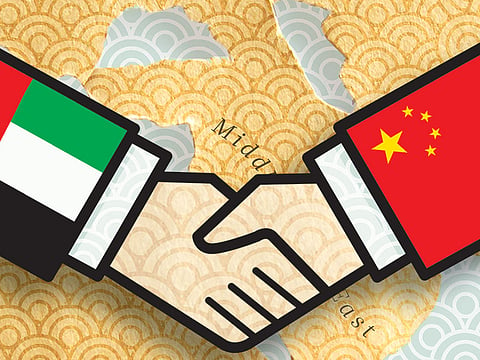Middle East can gain from China’s foray
Beijing’s close ties with the Gulf states, as evident in President Xi’s visit to UAE, will contribute to the long-term security and stability of a volatile area

China is eyeing the Middle East as a cornerstone in the implementation of its vision for strengthening global trade flow: The ‘Belt and Road Initiative’, better-known as the New Silk Road project, which was launched last year. At a time when the United States is engaged in controversial tariff spats with its biggest trading partners, Beijing is looking to enhance its position as the second-biggest economy in the world through bilateral agreements with countries in Africa, South America, South Asia, Central Asia and now the Middle East.
During a historic visit to the UAE last week, Chinese President Xi Jinping held strategic discussions with His Highness Shaikh Mohammad Bin Rashid Al Maktoum, Vice-President and Prime Minister of the UAE and Ruler of Dubai, and His Highness Shaikh Mohammad Bin Zayed Al Nahyan, Abu Dhabi Crown Prince and Deputy Supreme Commander of the UAE Armed Forces. The discussions resulted in the signing of 13 agreements and memoranda of understanding (MoU) between the two countries with the aim of strengthening strategic partnerships and bilateral cooperation across various sectors.
A joint statement issued at the end of the visit stressed the keenness of both countries to deepen cooperation within the ‘Belt and Road Initiative’ to establish sustainable trade and investment partnership for common interests.
The agreements and MoUs cover a wide range of areas, including high-level political coordination, bolstering cooperation in economic and financial fields and welcoming the UAE as an important partner in the construction of the ‘Belt and Road Initiative’. In addition, the UAE and China will enhance cooperation in innovation, technology transfer and economic diversification. Other areas of cooperation will cover education, science and technology, renewable energy, oil and gas, military, security, cultural and humanitarian fields.
The two sides agreed to maintain contacts, exchange visits and participate in joint events in order to carry out these agreements, which will benefit both nations. China is a major importer of Gulf oil and its economic activity depends on securing long-term cooperation with its suppliers. It is already the largest trading partner with most countries in the region. But China is also a major industrial and technology focal point and the UAE’s government and private sector stand to gain from a closer collaboration with Beijing.
More importantly, China’s close ties with the Gulf states will contribute to the long-term security and stability of this volatile region. UAE ports and free zones will become major hubs for China’s new Silk Road Project, creating new regional trade zones and boosting global commerce.
China’s pivot to the region gained traction when the leaders of Kuwaiti Emir Shaikh Sabah Al Ahmad Al Jaber Al Sabah, and President Xi witnessed the signing of strategic agreements week before last in the Chinese capital. The agreements will expand cooperation in areas including energy, infrastructural construction, finance, trade and investment and reinforce security and anti-terrorism cooperation, according to Xinhua, the Chinese news agency. The two countries will synergise the ‘Belt and Road Initiative’ with Kuwait Vision 2035 and work to promote the establishment of a China-Gulf Cooperation Council (GCC) free trade area at an early date.
And China’s interest in the region extends beyond the GCC. In a meeting with representatives of 21 Arab states in Beijing on July 10, Xi pledged a package of $20 billion (Dh73.56 billion) in loans and about $106 million in financial aid to regional countries, as part of what he called an “oil-and-gas plus” model to revive economic growth in the region. According to Reuters, China would offer aid to the tune of $15 million to Palestine to support economic development, besides providing a further $91 million to Jordan, Lebanon, Syria and Yemen.
Xi told Arab representatives that China would like to form a strategic partnership to become “the keeper of peace and stability in the Middle East ... and good friends that learn from each other”.
China has no colonial history in this part of the world and as such it is viewed positively by Arab citizens. In addition, Beijing has a long-standing record in supporting Arab causes and in contributing to the stability of the region. Its growing presence in the region should help create a much-needed balance at a time when many observers believe America’s influence is waning.
And at a time when the US is resorting to protectionist policies that stand to upset global free trade, China — along with the European Union, Japan, Canada and India — is seeking to strengthen economic ties. China’s arrival in the region and its commitment to expanding trade and investments should be seen as a positive development for an area that continues to battle unemployment, poverty, decaying infrastructure and regional turbulence.
Osama Al Sharif is a journalist and political commentator based in Amman.


